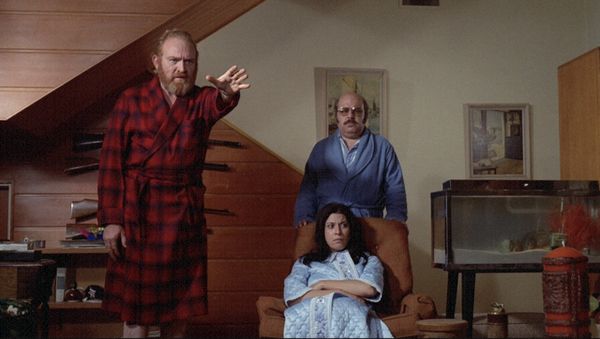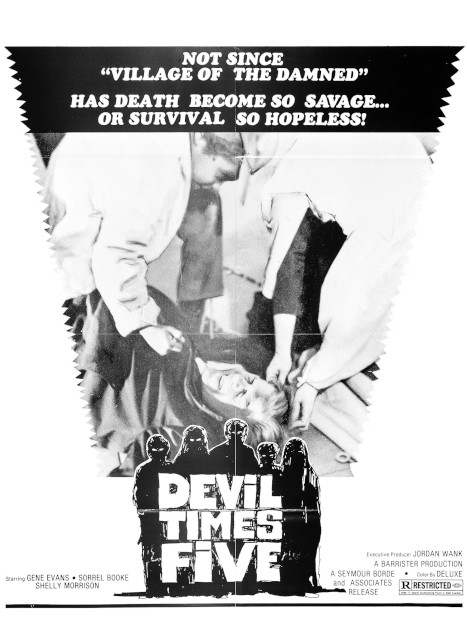Eye For Film >> Movies >> Devil Times Five (1974) Film Review
Devil Times Five
Reviewed by: Jennie Kermode

A comparatively early entry in the sub-genre of films which use children as villains, compromising adults’ ability to recognise or counter the threat, Devil Times Five is a period curiosity with ropy acting, worse dialogue and some frankly ridiculous characters, yet it’s still somehow fascinating. Also known as The Horrible House On The Hill and People Toys, it’s what one might expect if somebody poured the early 1970s into a blender and then threw the resulting mixture at a screen. With a 50th anniversary screening at the 2024 Fantasia International Film Festival, it’s ready to reach a new audience.
There are strains of pan pipe music – what else? – as a car drives along a snowy mountain road, its inhabitants looking forward to a break from the rat race in a remote location where they imagine they can find peace. Not long afterwards, a yellow minibus takes the same route, only to veer off and crash in a comedically long rolling sequence. Children drag out the bodies of those who didn’t make it, going through their pockets before having them blessed by a young nun. We will soon learn that these kids come from a psychiatric institution, which – this being the Seventies – immediately labels them as homicidal. Naturally they will seek refuge in the same labyrinthine house as our adult protagonists.
Those adults are not, as a rule, very easy to like. One might sympathise with mentally disabled caretaker Ralph (John Durren), but there’s an uncomfortable scene early on in which one of the guests, a woman with the bizarre name of Lovely (Carolyn Stellar) attempts to seduce him into something he clearly doesn’t want, creating a jarring tone that never quite goes away, despite the intervention of another guest, Julie (Joan McCall). The two women then engage in one of those bizarre fights popular in the soft porn of the era which involve a lot of rolling about and squealing at feeble little slaps, and it’s a wonder they don’t choke on one another’s hairspray.
Sexual neuroses preoccupy the adults throughout. After announcing that she’s previously slept with Julie’s husband, Rick, Lovely becomes the target of her ongoing jealousy, which Rick finds hilarious, mocking his wife and demeaning Lovely on the basis that she has (supposedly) slept with everyone. Naturally, she meets a sexualised fate, in a scene which also involves animal suffering (not intentional but a consequence of inadequate consideration on the crew’s part). The married women have husbands who are considerably older and uglier than they are, yet one of them complains perpetually about his wife rejecting his amorous advances; he also accuses her of irresponsible drinking, which, in the circumstances, is a sympathetic life choice.
If one were generous, one might suggest that it’s this age gap which leads the men to refer to the women as ‘girls’ and hide the details of the various deaths from them, rather than this being simply another product of Seventies sexism and lazy plotting. The early deaths don’t deliver much in terms of excitement or gore, with one of them taking so long – due in part to a slowed-down frame rate – that you’ll wish you’d brought a book. This little hint of artistic ambition heralds more successful flourishes later on, but the way the camera is used is unfortunately let down by most of what the camera has to look at.
When it comes to performances, the day is unexpectedly saved by the kids. Much of what they do is quite natural. One suspects that it’s because they’re getting no direction at all. This is somewhat worrying, however, in light of scenes in which one of them flirts with an adult, apparently trying to expose his paedophilic tendencies – one hopes that they got proper support on what was by all accounts a chaotic set, on which the director and producer violently attacked one another on at least one occasion. One of the young actors has since said that he enjoyed this atmosphere, however.
The acting by the adult cast is generally terrible, but all in the same way, which suggests that at least some of the blame should fall on the director. In its way, it’s a style that suits the general scuzziness of the characters and the despair embedded in the drama, which gives us no reason to root for them. Viewers might find satisfaction in the idea of a corrupt older generation being moved out of the way – the irony of course being that the emotionally underdeveloped, homicidal newcomers responsible, who hint that they plan to move on, reshaping the world on their terms, will grow up to be known as the Boomers.
Reviewed on: 20 Jul 2024
















